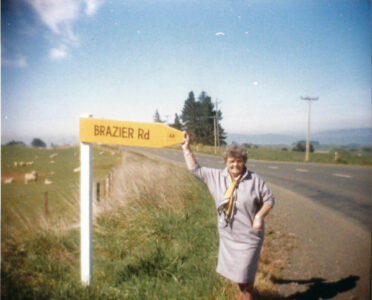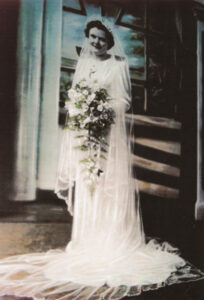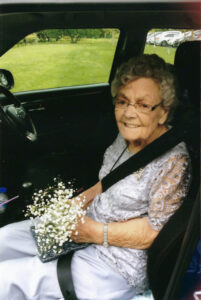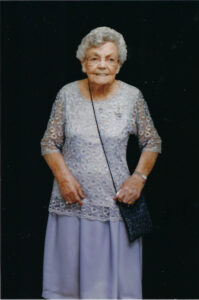
Dot (Dorothy) Brazier had to spend her 100th birthday locked down last year so her 101st birthday party this Saturday is going to be wild.
Dot’s birthday is today so he is warming up to the weekend’s festivities. There’s already much activity going on with the arrival of her son Lance from overseas. She will also have a new outfit to celebrate the great day.
As Dot was unable to attend the World of Wearable Art, her granddaughter Gabrielle Dalton-Wilson kept her promise to her great nana that Nana would be able to see the creation so for her birthday today modelled her award-winning Wearable Arts garment “Take only photos leave only splashes” (best story telling garment) at the Howick Baptist Home for her great nana and the other residents.
Dot’s 101th birthday celebrations on Saturday will see her surrounded by extended family including great grandchildren and friends. She resides in Howick Baptist Retirement Home.
Dorothy Frances Earley was born in Dunedin on September 8, 1921, the eldest of three girls to Ernest and Maggie Earley.
Dot moved to Nightcaps (a very tidy little town where everyone knew each other in the Southland Region) after she married Bill Brazier in Invercargill in September 1942. Bill worked underground in the Ohai Mines, where he was buried for days but was fortunate to be one of the survivors. While in Dunedin being treated for his injuries, he went to watch the marching girls. It was at this point that Dorothy marched into his life as she was the leader of the Cadbury marching team.

Dot was a great home maker and wonderful mother to Bill’s six-year-old son Neville (whose mother died of TB) and then to their own children Gaynor, Lance and Royce. Bill died in May 1986.
The tasks of motherhood were somewhat different in the 1940s. There were no disposable nappies. Instead snow was collected in buckets and heated in a cooper over a fire in the laundry. The house water pipes would freeze in winter when snowed. On the rare occasion it would even snow on Christmas day.
She loved playing sport, specifically golf and tennis but had a great passion for crafting. Dot was legendary at creating crafts and did the lot – knitting, quilting, leather work, cane making, sewing, beading, card making, crochet. She enjoyed helping and caring for others (for example baking for them).
As to the secret of life, she says that eludes her. She remembers, though, those close to her that have gone. It was awful losing loved ones particularly her husband. Losing her eyesight has also prevented Dot from continuing with her crafts. Lockdown for her 100th birthday in hospital last year meant just two family members had access.

The way things were in days gone by
Mining
The “Pie Cart” a small engine that ran on a private railway line (the state line ended at Wairio), picked up the miners at the railway station. There were several mines throughout Nightcaps, Tinkertown and Ohai, both underground and open cast. Miners worked in pairs underground. Sometimes there would be a collapse, fire or a flood in the mine and the siren would sound – a dreaded sound that signalled trouble in the mine. Bill’s mate was killed in a fall of coal and Bill half-buried. Even 10 years later he would have splinters of coal work their way out of his head that Dot would pull out with tweezers. Bill was left with ongoing problems from being buried underground. He went to Invercargill for a short time before returning and working in an open cast mine near Tinkertown called Coaldale.
Baking
Bill would toot his truck horn as he went past the house on the way to the Nightcaps railway station to tip a load of coal into the railway wagons. On his return, a flag was put up at the letter box indicating a tin of home baking was there for collection. Dot would stoke up the coal range on a daily basis and use one of the very early Kenwood Chef cake mixers to bake yoyos, marshmallow squares, Afghans, melting moments, peanut brownies, slugs and rainbow cakes – some of the favourites. In the school holidays, Dot’s daughter Gaynor would help with the baking and her brothers were good at scraping the bowls and beaters. A huge chest freezer was purchased for the wash house, so Dot did not have to bake daily throughout the hot summer. In the wash house there were two concrete tubs and later a washing machine. A cooper was used for bottling fruit and making soap. Dot was a hard worker.
Other food
Dot had a lovely flower garden and there was a great vegetable garden. When the carrots, parsnips, turnip and swedes were fully grown, they would be dug up and put into sugar sacks and then buried back into a hole to keep them fresh and prevent them from going to seed. Fresh potatoes would be stored in sacks in a dark corner. Pumpkins were stored on a shelf. Dry food was bought in bulk – cotton sacks of flour and sugar. Mutton birds were stored in a kelp bag. There were Bluff oysters and whitebait. Venison, crayfish, fish, mutton, rabbit and beef was stored in the freezer. Pigs were made into ham and bacon and hung from the ceiling. Eggs were preserved and put in a crook for baking. Dot made beautiful jams and pickles. There was always plenty of food. Dot made the children clothes, sewed and knitted warm socks, gloves, jersey and hats. On cold days, Dot heated smooth stones in the oven of the coal range for the children to hold and put in their pockets to keep them warm on the way to school. Dot made sure the children had a clean ironed hanky for school each day that was inspected, if you did not have a hanky, students were made to use newspaper to blow their nose. Other things differed at school where the National anthem was sung every morning, and students were given the leather strap on the hand for words misspelt.

Excursions
After work during summer Dot would take her children to swim in the river. If the tank was low the river would serve as a bath – complete with soap and shampoo. The river was also used to wash clothes. To complete the experience Dot would cook a full meal, including pudding, on the camp cooler. At weekends the truck tray would be lined with canvas, with cushions and rug thrown in, with a crane pram – to accommodate family and friends for a day trip to Blue Cliffs. Games were played including cricket – when a cricket ball was lost in the sea it was replaced by a chunk of kelp being whittled by a knife into a ball. Dot supplied a delicious lunch consisting of pikelets, scones, baking and pies (bacon & egg, mince, sausage/apple &onion). The flounder net would be used and sometimes the men would go to the blow holes and catch crayfish – making the most of the long days as it doesn’t get dark till late (10pm). “Man’s Van” came every Friday from Riverton, where Dot would sometimes buy a treat for the children, a small children’s ice cream in a pink cone for half a penny. On Sunday morning’s they were off to church, when the first bell rang, there was 20 minutes to get there. Mid-week, the extended family (including cousins and grandparents) would stand around the currant and gooseberry bushes eating fruit and catching up on the news or the latest instalment of “Dad and Dave” from Snake Gully, that was broadcast on the radio. Kids then rolled down the front lawn slope, dodging the well-manicured shrubs, until the hedge before the road. In winter, homemade sledges were used. The children created their own fun, while Dot played tennis, golf and bowls. Much excitement was had when the circus came to town. The elephant would go to the stream and fill his trunk with water and spray himself and the children watching from the bridge.
Significant event
In 1950 a fire swept through the town on a windy day resulting in the loss of the hotel, town hall, garage, Grant’s draper shop and Sinclair’s workshop that doubled as an undertaker. Dot recalls that they had a saying about the workshop/undertaker, “We put them up and we put them down”.










